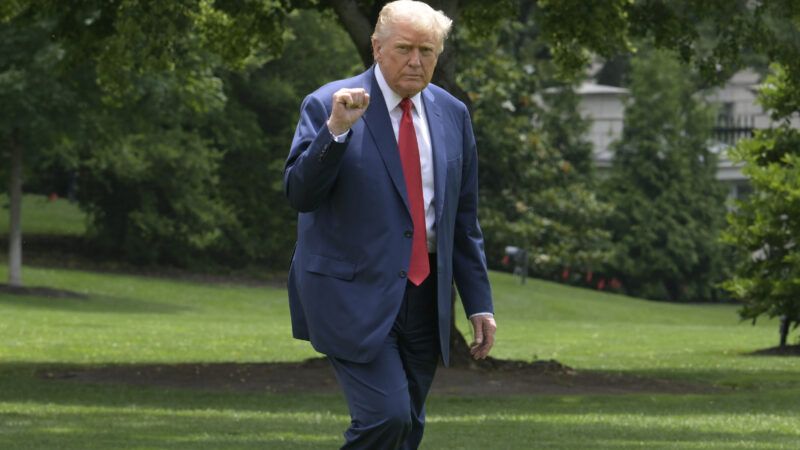Trump's Threats Against Musk and Newsom Reflect an Authoritarian Intolerance of Dissent
Even if the president was joking in both cases, he already has used his powers to punish people whose views offend him.

On Monday, President Donald Trump endorsed the arrest of California Gov. Gavin Newsom, who irked him by criticizing his militarized response to Los Angeles protests against his administration's immigration raids. Just four days earlier, Trump had suggested that billionaire entrepreneur Elon Musk, his former ally, could lose his government contracts for going public with concerns about the president's fiscal recklessness.
It's not clear whether Trump was serious in either case, whether he intends to follow through on his threats, or exactly how that would work. But the authoritarian intolerance of dissent reflected in those comments is consistent with the various ways Trump already has used the powers of his office to punish people whose views offend him.
Over the weekend, Trump deployed 2,000 members of California's National Guard to protect federal personnel and property, invoking a law that authorizes such action when "there is a rebellion or danger of a rebellion" against the U.S. government's authority. That unilateral step, Newsom argued, was unnecessary, provocative, and illegal because local and state law enforcement agencies were willing and able to maintain order without federal intervention.
This was the context in which a reporter asked Trump whether Newsom should be arrested, noting that border czar Tom Homan had threatened that consequence for "anybody," including Newsom, who interferes with the immigration crackdown. "I would do it if I were Tom," Trump replied. "Gavin likes the publicity, but I think it would be a great thing."
Maybe Trump was joking. Maybe he also was joking when he argued, during the public flap that Musk provoked by slamming a Trump-backed bill as a "disgusting abomination" that would add trillions to the national debt, that "the easiest way to save money in our Budget" would be to "terminate Elon's Governmental Subsidies and Contracts."
Then again, maybe not. No such excuse is available for Trump's plainly serious crusades against foreign students, lawyers, universities, and new outlets he portrays as enemies of democracy and American values.
By deporting students who criticize the Israeli government, Trump says, he is fighting antisemitism and protecting U.S. foreign policy interests. The goal, he explains, is to make students think twice before they open their mouths.
"Any student that protests," Trump said during his 2024 campaign, "I throw them out of the country. You know, there are a lot of foreign students. As soon as they hear that, they're going to behave."
To justify his executive orders against disfavored law firms—which aimed to ruin them by revoking their security clearances, restricting their access to federal officials and buildings, canceling their government contracts, and threatening other contractors with ties to them—Trump likewise cited their support for causes and clients he abhors. Federal judges therefore had no difficulty concluding that the orders violated the First Amendment.
Trump's conflict with Harvard, framed as an attempt to enforce federal civil rights laws, extends far beyond that goal. The administration has said the university cannot regain access to federal research grants unless it surrenders academic freedom by implementing a litany of hiring, admission, administrative, curricular, and disciplinary reforms.
Trump is still pursuing his legal vendetta against CBS News, which he absurdly claims committed consumer fraud by editing a pre-election 60 Minutes interview with Kamala Harris in a way that made her seem slightly more cogent. In February, he upped the ante by raising his already risible estimate of the damages inflicted by that interview from $10 billion to $20 billion.
Trump's beef with CBS is not limited to his abuse of the legal process as a private litigant. Brendan Carr, the Trump-appointed chairman of the Federal Communications Commission, reopened an equally groundless investigation of the network for "broadcast news distortion" based on the same interview—a probe that entails second-guessing journalistic judgments protected by freedom of the press.
Given this track record, it may not be safe to assume that Trump is only kidding when he threatens government retaliation for constitutionally protected speech.
© Copyright 2025 by Creators Syndicate Inc.


Show Comments (31)